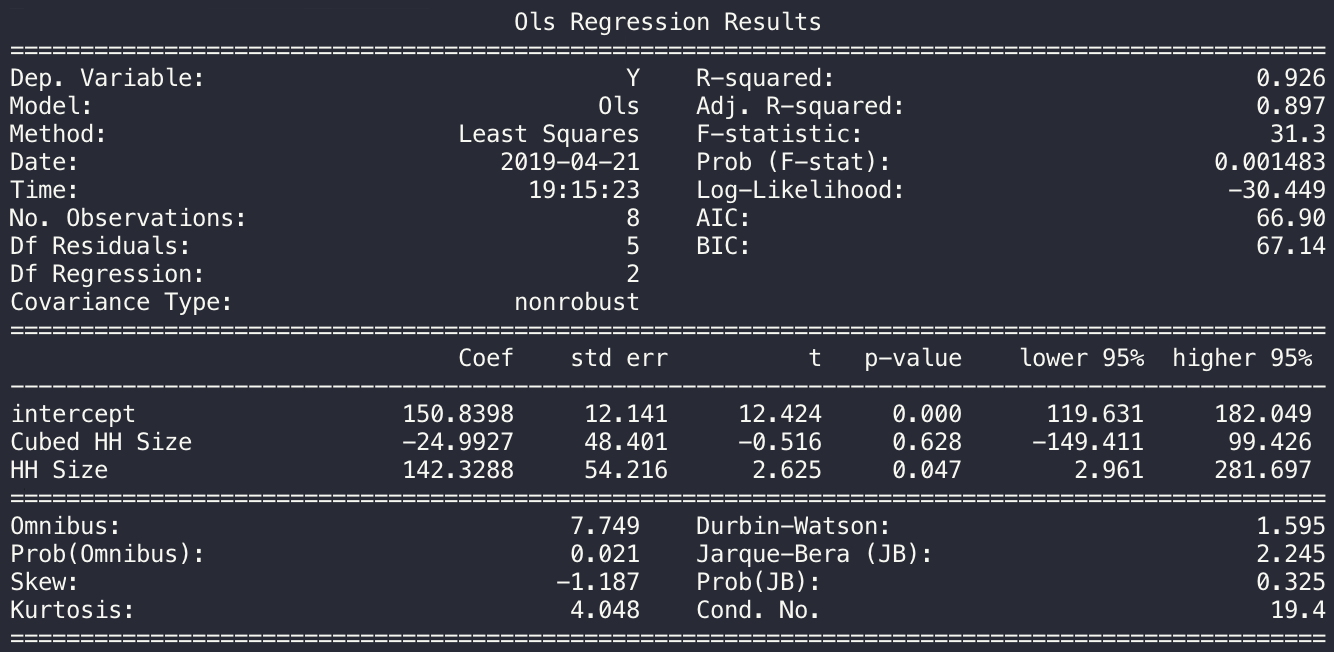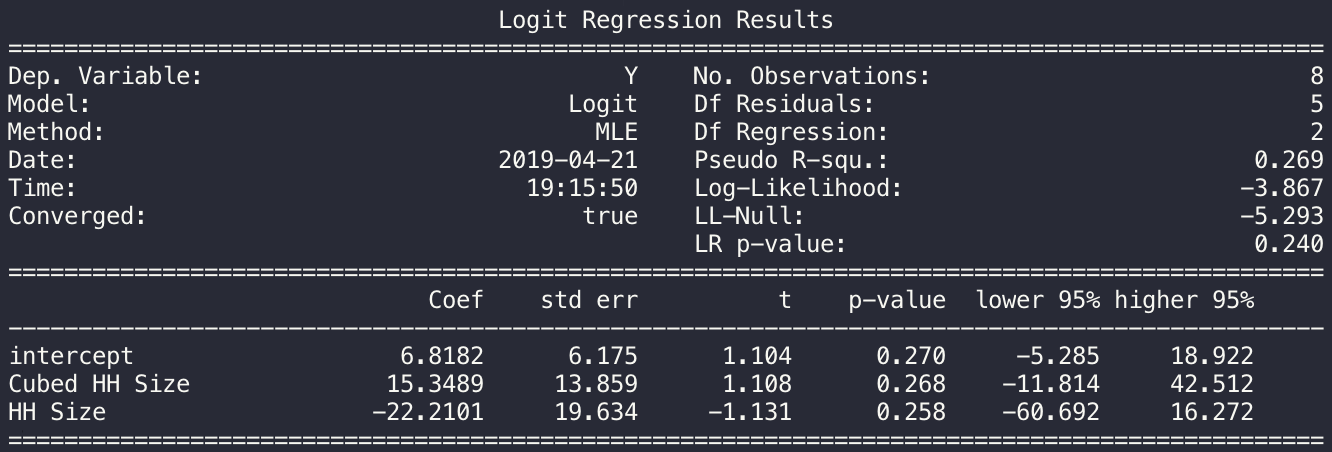smodels v0.1.3
smodels
An experiment in bringing Data Science and Statistics to Javascript.
Installation
Install via npm
npm i smodelsLinear Regressions
smodels currently supports 3 linear regression models 1. Ordinary Least Squares 1. Generalized Least Squares 1. Weighted Least Squares
Setting up the regression
// require it
const stats = require('smodels')
// sample data
let td = {
endog: {'title':'Y', 'data':[150.697, 179.323, 203.212, 226.505, 249.633, 281.422, 256.2, 231.2]},
exog: [
{'title':'Cubed HH Size', 'data': [0, 0.04, 0.16, 0.36, 0.64, 1.00, 0.8, 0.9]},
{'title':'HH Size', 'data': [0, 0.2, 0.4, 0.6, 0.8, 1.0, 0.8, 0.9]}
]
}Ordinary Least Squares regression (OLS)
// create and fit model
let model = new stats.Ols(td.endog, exog).fit()Generalized Least Squares regression (GLS)
// create and fit model
let model = new stats.Gls(td.endog, exog).fit()Weighted Least Squares regression (WLS)
// create and fit model
let model = new stats.Wls(td.endog, exog).fit()Display Summary Results
// add constant to exogenous values
let exog = stats.addConstant(td.exog)
// fit the model
let Ols = new stats.Ols(td.endog, exog).fit()
// Print summary
Ols.summary()
Prediction (in & out of sample)
// add constant to exogenous values
let exog = stats.addConstant(td.exog)
// fit the model
let Ols = new stats.Ols(td.endog, exog).fit()
// In Sample
Ols.predict(Ols.X)
// Out of Sample
Ols.predict({exog:[ [1, 0.12, 0.8] ]})Attributes
// add constant to exogenous values
let exog = stats.addConstant(td.exog)
// fit the model
let model = new stats.Ols(td.endog, exog).fit()
console.log(model.params)| Attribute | Description |
|---|---|
| resid | Residual values |
| params | The beta coefficients of the fitted model |
| bse | The standard errors of the regression coefficients |
| btstats | The T-statistic of the regression coefficients |
| pvalues | The p-values of the regression coefficients |
| confInt | Confidence Interval for the regression coefficients |
| fvalue | F-statistic of the model |
| fProb | P-value of the F-statistic |
| llf | Likelihood function of the fitted model value |
| aic | Akaike's information criteria |
| bic | Bayes' information criteria |
| N | The number of observations in the dataset |
| K | The number of parameters in the model |
| X | Array of X value rows |
| rsq | R-squared of a model with an intercept |
| rsqAdj | Adjusted R-squared |
| omnibus | Omnibus normality test |
| skew | Skew |
| kurtosis | Kurtosis |
| jarqueBera | Jarque-Bera test for normality |
| durbinWatson | Durbin-Watson statistic |
| conditionNumber | Condition Number (via euclidean norm) |
| ssRegression | Sum Squared of the regression |
| ssResidual | Sum Squared of the regression |
| ssTotalCentered | Sum Squared total centered |
| ssTotalUncentered | Sum Squared total centered |
| mseRegression | Mean Square error of the Regression |
| mseResidual | Mean Squared error of residual |
| mseModel | Mean Squared error of model |
| ess | Explained Sum of Squares |
Logistic Regression
smodels also supports Logit regression for modeling binary dependent variables
Setting up the regression
// require it
const stats = require('smodels')
// sample data
let td = {
endog: {'title':'Y', 'data':[150.697, 179.323, 203.212, 226.505, 249.633, 281.422, 256.2, 231.2]},
exog: [
{'title':'Cubed HH Size', 'data': [0, 0.04, 0.16, 0.36, 0.64, 1.00, 0.8, 0.9]},
{'title':'HH Size', 'data': [0, 0.2, 0.4, 0.6, 0.8, 1.0, 0.8, 0.9]}
]
}Logit regression
// create and fit model
let model = new stats.Logit(td.endog, exog).fit()Display Summary Results
// add constant to exogenous values
let exog = stats.addConstant(td.exog)
// fit the model
let model = new stats.Logit(td.endog, exog).fit()
// Print summary
model.summary()
Prediction (in & out of sample)
// add constant to exogenous values
let exog = stats.addConstant(td.exog)
// fit the model
let model = new stats.Logit(td.endog, exog).fit()
// In Sample
model.predict(model.X)
// Out of Sample
model.predict({exog:[ [1, 0.12, 0.8] ]})Attributes
// add constant to exogenous values
let exog = stats.addConstant(td.exog)
// fit the model
let model = new stats.Logit(td.endog, exog).fit()
console.log(model.params)| Attribute | Description |
|---|---|
| resid | Residual values |
| params | The beta coefficients of the fitted model |
| bse | The standard errors of the regression coefficients |
| bzstats | The T-statistic of the regression coefficients |
| pvalues | The p-values of the regression coefficients |
| confInt | Confidence Interval for the regression coefficients |
| N | The number of observations in the dataset |
| K | The number of parameters in the model |
| X | Array of X value rows |
| llf | Likelihood function of the fitted model value |
| llnull | Likelihood function null model |
| llrPvalue | Likelihood Ratio p-value |
| pseudoRsq | McFadden's pseudo - R - Squared |
Motivation & Roadmap
smodels was created see if javascript could be used for data science. While there are a lot of things that I really enjoy about JS, I think it will be difficult for the language to be widely adopted for data science.
Floating point arithmetic
Javascript struggles with basic math because of the way it handles floating point arithmetic. For example:
> 0.1+.0.2
0.30000000000000004While these issues can be solved with libraries such as Decimal and BigNumber it is still annoying for the average user. smodels takes care of internal calculations using DecimalJS but not every data calculation is completed inside the library. In larger calculations it becomes tedious to always write out something similar to the following. Since not every calculation is done in the library, its not ideal to force users to wrap their calculations leading to less readable and more difficult to maintain codebases.
// forced fix:
Decimal(0.1).plus(0.2).toNumber()Pass by reference
Javascript objects and arrays pass by reference, while not as a big a deal as the arithmetic issue, I still find this leads to frequent errors. Python's pass by object reference is a bit more ideal for quick prototyping. There are ways to handle this mutability issue, and its doable but worth noting the limitations.
Roadmap
If I start to see demand for statistics in JS, and/or for this library, i'll focus on adding more models and expanding the library. If not, then it serves as a useful way for running a few regressions and experimenting in browser.